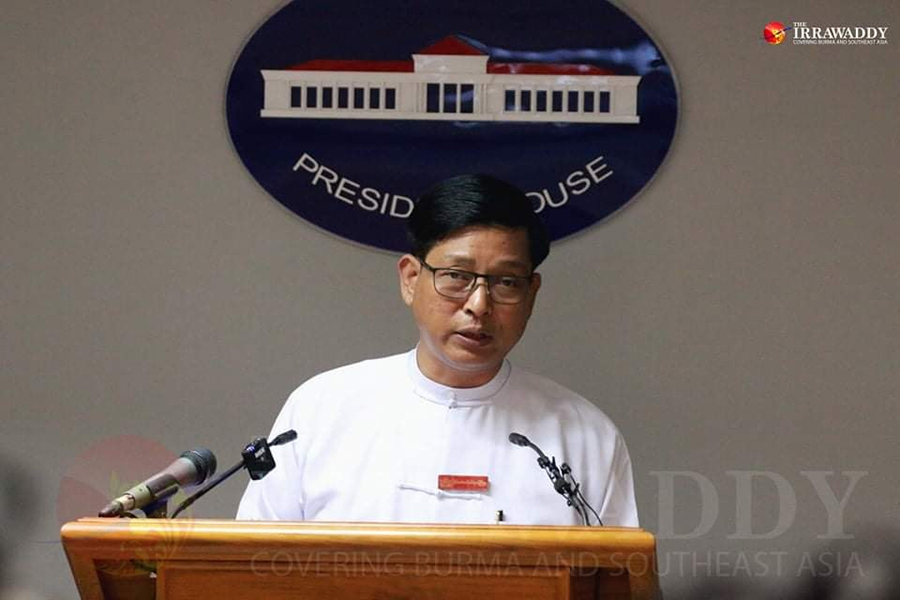The government will take legal action against those who run fake news pages after disinformation about the ruling National League for Democracy and a senior President’s Office official spread on social media last week.
On Tuesday, the Forward Media Group page–which has been removed from Facebook–posted a short news item quoting the spokesperson of the NLD’s central information committee, Monywa Aung Shin, as accusing U Zaw Htay, the director general of the President’s Office, of stabbing the NLD government in the back. However, the spokesperson was never interviewed for the story; Monywa Aung Shin later officially denied talking to Forward Media and filed a complaint with the Myanmar Press Council.
U Zaw Htay told reporters in Naypyitaw on Friday that the page published a post containing disinformation regarding both the content and the source. He added the government is investigating fake news and related pages.
“As the elections are near, especially, these posts aim to complicate the political situation,” said U Zaw Htay.

U Myint Kyaw, a joint secretary of the Myanmar Press Council, said the MPC received the complaint. “The MPC will put it in the list of fake news pages as the FMG is not an official registered online media outlet,” U Myint Kyaw said. But as the Council’s mandate is limited, it cannot launch an investigation about who is behind the pages. Only the government can do such an investigation as they have the resources, he said.
U Myint Kyaw last Tuesday started raising the alarm about FMG’s fake news post and the FMG page, and urged respective departments to respond to the fake news to stop it from spreading widely.
Since its creation in August last year, 80 to 90 percent of FMG’s posts have been copied from other media, and some of the posts are 100 percent fake and twist the facts, he explained to The Irrawaddy. According to the page’s transparency status, it had two admins, both located inside Myanmar.
According to Myanmar Now news, the page has posted over 60 fake news items, primarily targeting Daw Aung San Suu Kyi, her NLD party and government officials.
U Zaw Htay added that based on their tracking and analysis, “They [fake pages] intentionally distribute such misinformation to create misunderstanding between the government and the people, between the government and political parties, and between civil servants, the public and the government.”
He said the group behind this page (FMG) is based in Naypyitaw and had spent millions of kyats to disseminate misinformation, using Facebook’s “boosting” service to attract more users.
“We will take action against them in accordance with the law. We warn you. We are investigating,” he said. Politically, he urged such attackers to fairly contest elections and to highlight weaknesses in the central government that way, instead of disseminating fake news.
The Myanmar Press Council’s spokesman also welcomed the government’s move in tackling the fake news.
He urged the Ministry of Transport and Communications, which oversees social media monitoring, to do regular checks and take action against “fake news which is poisonous to the general public,” in addition to tackling defamation posts against government officials.
The Union government in early 2018 allocated 6.4 billion kyats (US$4.73 million) to the Ministry of Transport and Communications from its emergency fund to monitor social media in the fight against fake news and misinformation.
The ministry formed the Social Media Monitoring Team to investigate individuals threatening the country’s stability via social media. But it has been criticized for targeting actual news sites and outspoken individuals rather than individuals spreading fake news, disinformation and misinformation.
In March, the government ordered mobile network operators to block more than 200 websites and online pages, including some registered online media such as the Rakhine-based Narinjara News and Development Media Group (DMG), Mandalay-based Mandalay In-Depth News and Voice of Myanmar (VOM), and Tachileik-based Mekong News.
The Ministry of Transport and Communications “should be proactive in public affairs” and should carefully scrutinize and analyze whether a certain news site or social media page should be shut down or not, said U Myint Kyaw.
“From the government’s actions so far, they have missed the real targets [who are posting fake news and disinformation],” he added.
You may also like these stories:
Myanmar President Orders State, Regional Govts to Battle Hate Speech Amid COVID-19 Fight
Myanmar’s Military Returns to Facebook to Provide ‘Accurate’ News
Myanmar to Punish Facebook Users for Posting Fake Govt Order
Myanmar Govt Cracks Down on Fake COVID-19 News

















